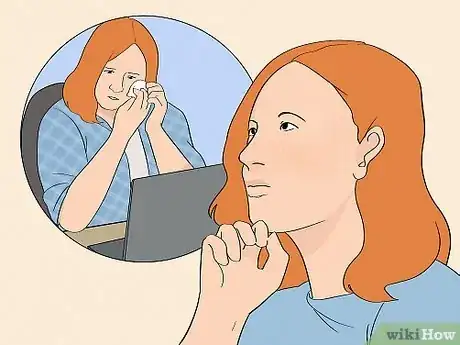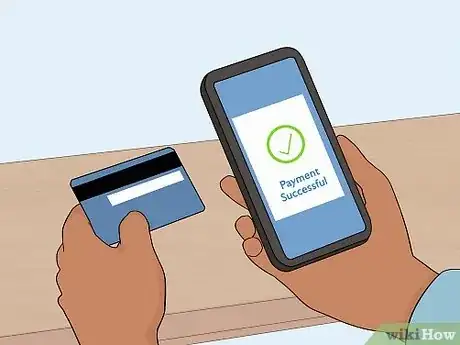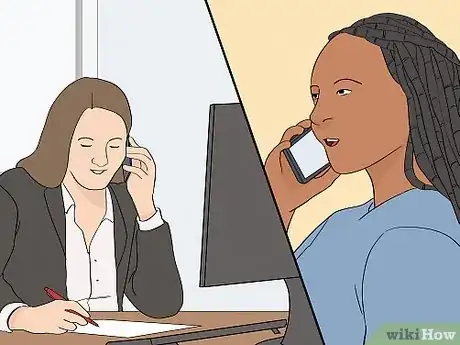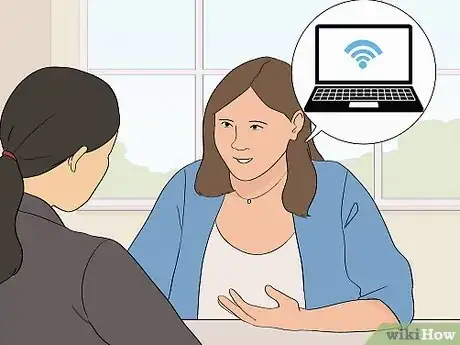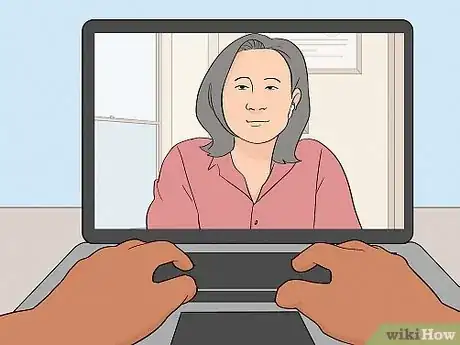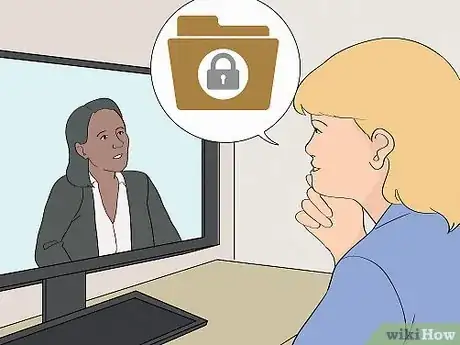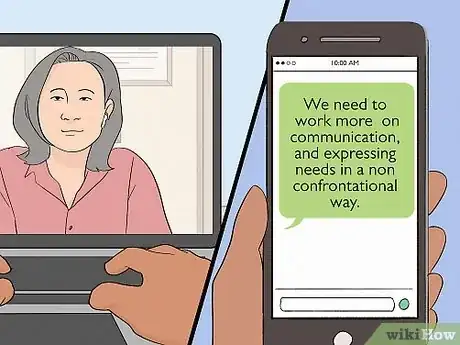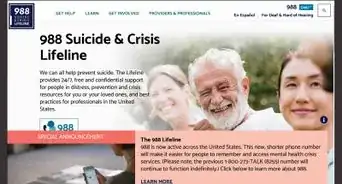This article was co-authored by Trudi Griffin, LPC, MS. Trudi Griffin is a Licensed Professional Counselor in Wisconsin specializing in Addictions and Mental Health. She provides therapy to people who struggle with addictions, mental health, and trauma in community health settings and private practice. She received her MS in Clinical Mental Health Counseling from Marquette University in 2011.
There are 10 references cited in this article, which can be found at the bottom of the page.
This article has been viewed 14,731 times.
Online counseling, also known as e-counseling or cyber-counseling, is an up and coming method of psychotherapy. This is when counseling is done over the internet, which provides remote or distance counseling to patients from the comfort of your own home or anywhere else you would like.[1] There are many different considerations that that need to go into it, but if you find the right counseling program, learn how to find the right counselor, and know what to expect, you can attend online counseling.
Steps
Getting Started with Online Counseling
-
1Seek in-person diagnosis. Although online counseling can be beneficial for you, counselors cannot diagnose you online. This means that you need to see a counselor or therapist in person to diagnose any mental health disorder you have.
- Once you have a diagnosis, you can look into online counseling help for your disorder.[2]
-
2Decide if online counseling works for your disorder. Once you have been properly diagnosed, you can decide if online treatment is right for your condition. If you have a common or simply treated mental disorder, online counseling may work for you. If you have a severe mental illness that needs direct and close treatment, online counseling is not right for you.
- Online counseling is also not helpful for those with complicated or complex disorders that manifest in many different ways, such as schizophrenia, bipolar disorder, obsessive compulsive disorder (OCD), or other serious conditions.[3]
- If your condition is severe or complex, look into traditional counseling for help.[4]
Advertisement -
3Determine if it is helpful for your situation. There are different types of people that might benefit from online counseling based on their life situation. If you live in rural or remote areas that do not have easy access to in person counseling services, you could greatly benefit from online counseling. It can also be easier if you have mobility limitations or other physical impairments that make it difficult to travel.[5]
- This can also be helpful if you travel or are away from one central location for months at a time.[6]
-
4Pay attention to the cost. In many cases, online sessions are cheaper than in person counseling sessions, but they may not be.[7] When choosing an online counselor, make sure you know up front how much it is going to cost you. Also ensure that you have a secure way to pay for the services
- If you are working with a counselor you have seen in person in the past, your sessions may be cheaper than the in person ones due to the reduction in gas and office maintenance. Ask your counselor about the difference in cost.[8]
-
5Determine if your insurance will pay for online counseling. One major concern for you when deciding to do online counseling is the cost. Many insurance providers will now help pay for online counseling sessions, but there may be stipulations or requirements. There are other insurance plans that will not cover them, but some therapists offer affordable payments for patients who cannot get coverage for counseling sessions.[9]
- If you are unsure if your insurance plan will cover it, call your insurance company or go to their website to check.[10]
Looking For a Reputable Counselor
-
1Ask your counselor to move online. Some counselors will provide online therapy sessions after you've seen them in person. This can be convenient for you or your counselor. This is especially helpful if you go on vacation or move to another state.[11]
- If you have been seeing a counselor, ask if he or she would be willing to move to online sessions instead of in person ones.[12]
-
2Find an online counselor. If you haven't already been seeing a counselor in person, you need to make sure that you find a reputable online counselor. There are many online counselors that are reputable, but there are also many people who are not licensed and are only posing as counselors to make money.[13] Look for online counselors that are part of national mental health associations or verified safe websites.
- A good way to tell if a counselor is qualified is the amount of personal and professional information given, such as the degrees held, what states he or she is licensed in, and real world contact information.[14]
- You can also ask if your counselor has an in person practice as well. This will also let you know if your counselor can be trusted or that he or she is licensed.[15]
- If you are unsure, use the online locator from the International Society for Mental Health Online (ISMHO). They have reputable members all over the world who can provide online counseling help.
-
3Make sure the counselor is licensed. Another major qualification that you need to be sure of is that your counselor is licensed. The counselor should be licensed to do counseling or therapy in his or her home state as well as your home state.[16] Ask your counselor to see which places he or she are licensed.
- If your counselor is not licensed in your state or his or her home state, you will not have any legal rights if something were to go wrong.[17]
-
4Ask about privacy policies. Your counselor is required to keep your information private, but you do have the right to ask questions about her privacy policies. Ask your counselor who else has access to the computer used for the therapy sessions, if the sessions are recorded for any reason, and how and where your records are kept.[18]
- If you also contact your counselor over e-mail or chat, ask if he or she keeps transcripts and who else may have access to them.[19]
Having Counseling Sessions Online
-
1Find the right format. Online counseling can take many different forms. You can get a counseling experience similar to the in person sessions through video conferencing session such as Skype. You can also get help through online chats, e-mail, online phone calls, or online forums.[20]
- You can also do a mixture of all of these forms if your counselor is willing to or if your are interested in it.
-
2Pick the best time for you. One of the best advantages of online counseling is that you can schedule it at all times of the day instead of just business hours.[21] Once you pick an online counseling service, schedule your sessions at the right time for you that also coincides with your counselor's schedules.
- You can also work around your vacations and other life events as well.
-
3Make sure the right technology is in place. Many of the ways to do online counseling need you to have certain technology in order to do it.[22] The most basic is a computer with internet access. You may also need a microphone on your computer, a program that allows online calls or video calls, and an e-mail address.
- You should also make sure your counselor has these technologies at his or her disposal as well so you can connect in multiple ways.
-
4Get periodic help. There are websites that offer free, one time counseling sessions that you can get if you are not interested in having a personal counselor. Many online mental health websites provide online help seven days a week at certain hours of the day, some 24 hours a day.
- Many of these websites are disorder specific, so you can do some online research to look for the one that suits your needs best.
References
- ↑ http://www.nbcc.org/Assets/Ethics/NBCCPolicyRegardingPracticeofDistanceCounselingBoard.pdf
- ↑ https://www.verywell.com/what-is-online-therapy-2795752
- ↑ https://www.verywell.com/advantages-and-disadvantages-of-online-therapy-2795225
- ↑ https://www.verywell.com/advantages-and-disadvantages-of-online-therapy-2795225
- ↑ http://au.professionals.reachout.com/online-counselling-pros-and-cons
- ↑ http://au.professionals.reachout.com/online-counselling-pros-and-cons
- ↑ http://au.professionals.reachout.com/online-counselling-pros-and-cons
- ↑ http://www.nytimes.com/2011/09/25/fashion/therapists-are-seeing-patients-online.html?_r=0
- ↑ https://www.verywell.com/advantages-and-disadvantages-of-online-therapy-2795225
- ↑ https://www.verywell.com/advantages-and-disadvantages-of-online-therapy-2795225
- ↑ http://www.nytimes.com/2011/09/25/fashion/therapists-are-seeing-patients-online.html?_r=1
- ↑ http://www.nytimes.com/2011/09/25/fashion/therapists-are-seeing-patients-online.html?_r=0
- ↑ http://au.professionals.reachout.com/online-counselling-pros-and-cons
- ↑ http://ismho.org/resources/archive/suggested-principles-for-the-online-provision-of-mental-health-services/#Counselor
- ↑ http://ismho.org/resources/archive/suggested-principles-for-the-online-provision-of-mental-health-services/#Counselor
- ↑ http://health.usnews.com/health-news/family-health/articles/2009/09/22/7-things-to-know-before-logging-on-for-counseling
- ↑ http://health.usnews.com/health-news/family-health/articles/2009/09/22/7-things-to-know-before-logging-on-for-counseling
- ↑ http://health.usnews.com/health-news/family-health/articles/2009/09/22/7-things-to-know-before-logging-on-for-counseling?page=2
- ↑ http://health.usnews.com/health-news/family-health/articles/2009/09/22/7-things-to-know-before-logging-on-for-counseling?page=2
- ↑ http://www.nbcc.org/Assets/Ethics/NBCCPolicyRegardingPracticeofDistanceCounselingBoard.pdf
- ↑ http://www.nytimes.com/2011/09/25/fashion/therapists-are-seeing-patients-online.html?_r=0
- ↑ http://au.professionals.reachout.com/online-counselling-pros-and-cons

